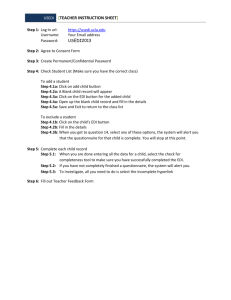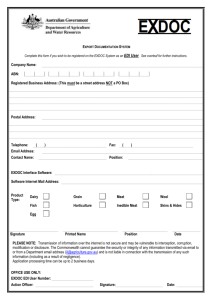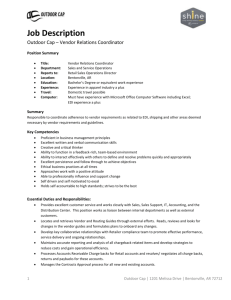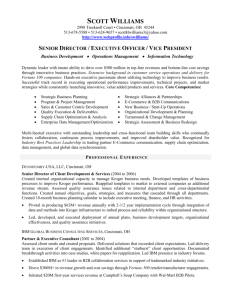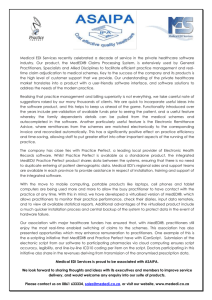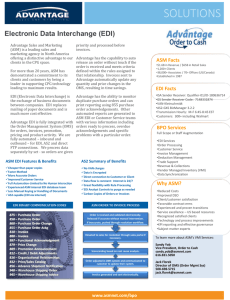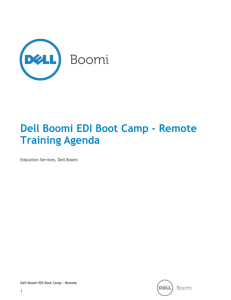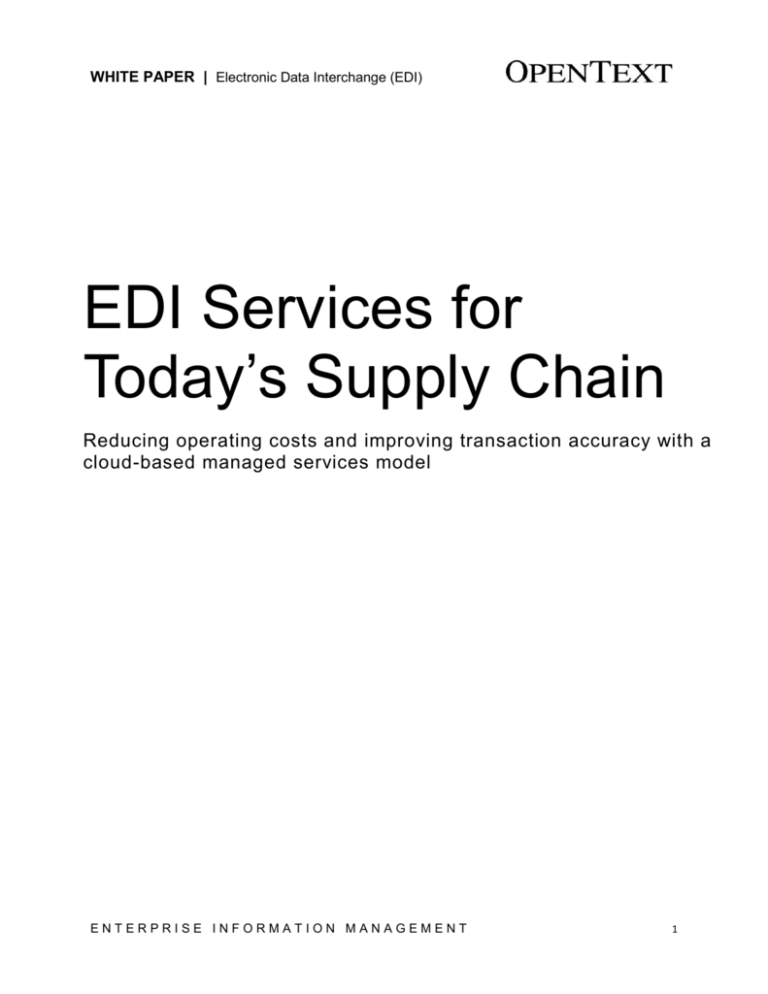
WHITE PAPER | Electronic Data Interchange (EDI)
EDI Services for
Today’s Supply Chain
Reducing operating costs and improving transaction accuracy with a
cloud-based managed services model
ENTERPRISE INFORMATION MANAGEMENT
1
WHITE PAPER | Electronic Data Interchange (EDI)
Executive Summary
Situation: It is becoming harder to find IT professional resources to support in-house EDI
technology.
For many new IT professionals entering the business marketplace, Electronic Data Interchange (EDI) is
considered an old technology. Rather than focus on EDI, most talented IT personnel are honing their skill
sets towards newer web-based technologies and mobile applications.
This diminished EDI talent pool has left many suppliers still dependent on the technology, yet without the
necessary resources to continue effectively managing their supply chain operations.
Problem: Maintaining in-house EDI support is more costly and can present greater financial risks.
For such suppliers, the costs of support, maintenance, and service increase each year. As retailers
change product, volume, and bundling information, accounting for these changes using an internal EDI
infrastructure increases the likelihood of errors and financial penalties on the overall supply chain
operation. These issues also increase the likelihood of customer-imposed chargeback fees, which can
significantly impact the supplier’s bottom line and their retail business relationships.
Other suppliers have chosen the option of using outsourced consultants to manage their internal EDI
transactions. Even with this alternative, the business still must bear the high costs associated with
infrastructure equipment and software acquisition and maintenance, which yields only minimal cost
savings.
Solution: An outsourced, managed EDI service lowers the cost of supply chain operations.
OpenText EasyLink EDI Managed Services moves part or all of a company’s EDI operations to a secure,
fully redundant cloud-based global infrastructure.
The OpenText EasyLink EDI professional services team efficiently manages EDI transactions, providing
unsurpassed “any-to-any” translation and creating an optimal supply chain system. From mapping and
translation to trading partner connectivity and help desk services, EasyLink EDI Managed Services
optimizes the efficiency, reliability, cycle times, and reach of an electronic supply chain operation while
reducing its total costs and constraints. Suppliers obtain world-class EDI functionality and support at a
fraction of the cost and resources associated with managing an internal EDI infrastructure.
Result: Managed EDI service significantly reduces financial risks and/or penalties, enables reallocation of
IT resources, and enhances positive supply chain relationships with retail customers. EasyLink
proactively monitors each EDI account and provides automatic real-time notification of any identified EDI
error as it occurs, along with a remediation plan to resolve it. This reduces the risk of chargebacks
imposed by a retail customer for unaccounted retail shipments.
As a result, suppliers that leverage the EasyLink EDI Managed Services methodology for all or a portion
of their supply chain operations can rapidly respond to changing retail requirements and build stronger
business relationships across the supply chain.
ENTERPRISE INFORMATION MANAGEMENT
2
WHITE PAPER | Electronic Data Interchange (EDI)
A lack of adequate resources is making it harder to
justify in-house EDI support
EDI is now a decades-old technology that remains critical for businesses that depend on it, while new
support resources are becoming increasingly harder to find. Rather than focus on EDI, IT professionals
entering the marketplace are trained and certified in leading-edge web-based and mobile application
technologies, security technologies, and other areas with higher growth and salary potential. As a result,
the scarcity of qualified candidates with the skills necessary to provide ongoing support for internal EDI
projects may be placing supply chain partners’ trading capabilities in greater jeopardy with their large
retail clients.
Along with a scarcity of qualified personnel is the high cost of maintaining an internal EDI infrastructure.
Not only are hardware, software, maintenance, and support costs growing higher each year, but suppliers
that cannot integrate their EDI systems with their large retailer customers face a greater number of
transactional errors and service disruptions that can become increasingly costly if left unresolved. These
issues increase the likelihood of customer-imposed chargeback penalties, which over time negatively
impact the business relationship between suppliers and retailers.
How costly are chargebacks? According to Vano Haroutunian, an attorney with Ballon Stoll Bader &
Nadler, “chargeback fees accounted for roughly five percent of a clothing supplier’s yearly sales ten years
1
ago. Today, that figure is roughly 20 percent.”
Other suppliers have opted for hiring in-house consultants to manage EDI. With this approach, the
business still incurs the costs of maintaining their own EDI infrastructure, such as upgrading and updating
hardware and software, and renewing maintenance contracts. The result: little, if any, cost savings and
the same high turnover among the outsourced consulting staff as with direct hires.
For an increasing number of businesses, outsourcing IT services to industry-leading third-party service
providers is continuing to gain traction as a cost-effective alternative to maintaining an internal IT
infrastructure and staff. Shifting the internal IT burden to an outsourced, cloud-computing model has
proven to be a cost-effective approach that generates high operational and cost efficiencies for supply
chain operations.
Instead of maintaining a complex internal infrastructure including hardware, software, security and
disaster recovery, suppliers now require a reliable, outsourced, cloud-based approach for their EDI
services that enables IT staff to refocus on improving business functionality and supporting core
operational practices.
With more than 20 years of e-commerce expertise, EasyLink EDI Managed Services provide a superior
EDI business model that addresses the technical, operational, and financial challenges inherent in
maintaining supply chain systems in support of supply chain partners and suppliers.
The goal of this white paper is to provide IT and financial professionals with the benefits associated with
an outsourced EDI service management model, and to explain how it can aid in reducing costs and
increasing operational efficiencies while also addressing the financial risks associated with routine supply
chain transactions that support large retail customers.
1 Source: RetailWire.com, “Clothing Vendors Take Chargeback Hit”, May 18, 2010.
ENTERPRISE INFORMATION MANAGEMENT
3
WHITE PAPER | Electronic Data Interchange (EDI)
The business challenges associated with in-house EDI
practices
As the costs and complexities associated with maintaining an internal EDI infrastructure increase, each
supplier must weigh the business risks and challenges associated with managing a large IT infrastructure
against the benefits associated with outsourcing this function.
Supply chain partners and suppliers that continue to practice in-house EDI methods using their own IT
infrastructure face costly operational challenges, including:
Inability to stay current with EDI technology changes and trends – Retail is a constantly
changing industry, and an EDI system must be frequently updated to accommodate changing
standards, protocols, and business parameters. For example, retailers will change pricing models,
volume discount levels, promotional offers, or supply chain procedures on a periodic basis that
must be reflected within the EDI system when goods are delivered. Suppliers that can rapidly
adapt their EDI system to accommodate these changes foster a more positive business
relationship with their retail customers. Suppliers that cannot will risk diminishing the relationship
or losing it altogether.
Lack of adequate EDI personnel resources and skill sets – With so much dependent on a
smooth supply chain operation, any significant change within an EDI-trained staff has a
corresponding impact on the retailer/supplier relationship. This becomes apparent when new
recruits must be retrained to the unique attributes and procedures with the retailer EDI system.
High turnover and inexperienced personnel create a greater number of EDI system errors and
missteps and, ultimately, higher operating costs.
Greater compliance risks and costly chargeback penalties – Retailers depend on the
accuracy and timeliness of Advance Shipping Notices (ASNs). Retailer-assigned chargebacks
associated with late shipments are often the result of incorrect UPC or item codes, errors in
transaction processing, failure to comply with retailer EDI specifications, or missing/damaged
packaging labels. These chargebacks can be costly, potentially shaving off 10 percent or more of
a manufacturer’s overall revenue, depending on the efficacy of the system.
Lack of an effective disaster-recovery plan – For suppliers that have data centers located in
severe weather locations, lack of a disaster-recovery plan creates a risk of extensive downtime
that can have catastrophic results for the supply chain operation. Any business that depends on
continuous operation must have an offsite disaster recovery plan for their EDI data and systems
in the event that a catastrophic weather-related or other event severely impacts data center and
EDI operational effectiveness.
EasyLink EDI Managed Services provide supply chain partners with a lower-cost outsourced operating
model that ensures accuracy and compliance with all EDI transactions. Wide-ranging EDI system
experience prevents costly retailer penalties and chargebacks, enables a sound disaster recovery plan,
and helps build stronger supplier/retail partnerships.
ENTERPRISE INFORMATION MANAGEMENT
4
WHITE PAPER | Electronic Data Interchange (EDI)
The EasyLink EDI Managed Services advantage
As suppliers ponder the high costs associated with maintaining an in-house IT infrastructure, many are
coming to the realization that they simply don’t have the experience or dedicated human resources to
drive mission-critical EDI capabilities essential for the retailer/supplier partnership. More and more, these
suppliers are looking to outsource their operations to a managed information model in an effort to better
support their EDI requirements.
EasyLink EDI Managed Services provide a secure, fully-redundant global infrastructure and an end-toend solution that moves the entire EDI operation to a secure EasyLink data center. EasyLink EDI
engineers efficiently manage all EDI transactions, providing unsurpassed “any-to-any” translation for an
optimal supply chain system. From mapping and translation to trading partner connectivity and help desk
services, EasyLink EDI Managed Services optimize the efficiency, reliability, cycle times, and reach of an
electronic supply chain while reducing its costs and constraints.
EasyLink EDI Managed Services solves the challenges associated with maintaining an in-house EDI
system in the following ways:
A full suite of messaging services — Effectively managing EDI isn’t only about supplier/retailer
messaging. Sometimes, EDI information must be faxed or incorporated into an Enterprise Resource
Planning (ERP) system as part of a workflow methodology. To more effectively support all EDIrelated business circumstances, suppliers need an EDI provider that can provide a full suite of
integrated, cloud–based messaging services such as fax, workflow, and document capture
management to create a fully customized EDI solution.
Personalized customer service — Suppliers can’t afford any EDI downtime, and having a readily
accessible and experienced support resource is essential. EasyLink provides live support personnel
on a 24/7 basis. With EasyLink personalized customer service, EDI transactional issues are resolved
quickly, facilitating a smooth and continuous supply chain operation with retail customers.
No outside or offshore resources — Unlike other cloud service providers that rely on offshore or
outsourced contract consultants, EasyLink maintains a full-time, in-house, company-trained staff
dedicated to the EDI function. This ensures the highest quality of service for every customer.
A single EDI portal — EasyLink provides a complete, B2B-managed messaging service with a
robust set of tools such as a single EDI portal that provides a web view into all EDI transactions
regardless of ERP application. These tools monitor EDI performance that facilitates the analysis of all
supplier relationships.
Proactive management — EasyLink proactively monitors each EDI account and provides automatic
real-time notification of any identified EDI errors as they occur, along with a reconciliation plan to
resolve them. This eliminates the reactive nature of most in-house EDI systems that only takes
corrective action after an EDI chargeback penalty has been issued by a retailer.
For example, if EasyLink does not receive a confirmation that a retailer has received an EDI message,
EasyLink contacts the trading partner on behalf of the customer to determine whether the message
was received, and what action may be required to resolve any issues.
ENTERPRISE INFORMATION MANAGEMENT
5
WHITE PAPER | Electronic Data Interchange (EDI)
Customer Brief: Mizuno USA, Inc.
Mizuno USA, Inc., one of the world’s largest sporting goods manufacturers, was experiencing rapid
growth in the United States and was on track to outpace the capabilities of its internal EDI systems and
resources. To contain costs and improve performance, Mizuno outsourced its EDI operations to EasyLink.
Mizuno rapidly and securely connected with their trading partners by leveraging the EasyLink-hosted
network infrastructure. EasyLink EDI technical experts provided Mizuno with a full range of services,
including “any-to-any” mapping, hosted translation of inbound and outbound data, connectivity
technologies, reporting, and notifications.
According to Keith Neely, Vice President of Information Technology & Customer Support at Mizuno USA,
Inc., the company realized a full return on their investment in only nine months—less than half the time
they expected, and they can now onboard a new customer three times faster than before the transition.
“EasyLink provides Mizuno with a best-in-class managed EDI supply chain that improves the accuracy of
our supply chain services, and has enabled our IT resources to focus on priority business initiatives.
Using EasyLink, we’ve reduced our chargebacks by 90%, which has clearly demonstrated the value of
the managed services model,” said Neely.
EasyLink EDI Managed Services provides an end-to-end EDI management solution, from mapping and translation to
trading partner connectivity and help desk services on a secure, fully-redundant global infrastructure. EasyLink EDI
Services allow any manufacturer or retailer to conduct EDI transactions, even in a non-VAN environment.
ENTERPRISE INFORMATION MANAGEMENT
6
WHITE PAPER | Electronic Data Interchange (EDI)
Conclusion
Cutting costs, especially with IT infrastructure expenditures, is now an essential business requirement
that must be managed on an ongoing basis. Companies must now do more with less during slower
economic cycles.
Outsourcing the EDI function is one area where companies can gain greater efficiencies while lowering
their operating costs by going to a fully managed and outsourced EDI model. Using this leveraged
business model, supply chain partners can focus on their core business practices without hand-holding
their EDI system or worrying if transaction messages will successfully be delivered to their important retail
customers.
EasyLink EDI Managed Services optimizes the efficiency, reliability, cycle times and reach of an
electronic supply chain while reducing its costs and constraints. EasyLink’s secure and fully redundant
global infrastructure offers unsurpassed “any-to-any” EDI message translation, ensuring an optimal
supply chain requiring no management from the supplier.
In summary, EasyLink EDI Managed Services provides the following benefits for companies wishing to
outsource their EDI function:
Greater operating efficiencies — EasyLink leverages practice gained from managing a
community of EDI business accounts within a shared environment and extending the benefits to
every EDI customer. By acting as an extension of an existing internal support resource, the
supplier organization obtains world-class EDI functionality and support at a fraction of the cost of
an internal EDI infrastructure.
Keeping pace with technology trends - Providing routine technology updates is one of the
primary components of an outsourced managed EDI service model. As a cloud-based, hosted
service, clients are removed from performing system upgrades for the latest protocol or security
update. With a team of dedicated experts, EasyLink is diligent about providing the most advanced
capabilities at the moment they are accessible in the marketplace. For example, EasyLink
2
recently added OFTP2 to support overseas suppliers, which is an updated security protocol used
predominantly in the European, Middle Eastern, and African region (EMEA).
Focus on core business — Outsourcing EDI to a managed model frees internal IT resources to
focus on core business functions and requirements without jeopardizing supply chain operations
or business relationships.
Lower-cost structure — EasyLink EDI Managed Services lowers all aspects of EDI-related
infrastructure costs such as maintaining hardware, software, updates, support, etc. Under a
managed service model, superior functionality is provided at a far lower cost, improving the
bottom line.
Built-in disaster recovery - EasyLink EDI Managed Services is a geographically diverse model.
EasyLink owns the network infrastructure and has several data centers to ensure rapid and
complete EDI operational recovery in the event of a catastrophic data loss.
2
Source: ODETTE Forum, https://forum.odette.org/OFTP/oftp2
ENTERPRISE INFORMATION MANAGEMENT
7
About OpenText
OpenText provides Enterprise Information Management software that enables companies of all sizes and
industries to manage, secure, and leverage their unstructured business information, either in their data
center or in the cloud. Over 50,000 companies already use OpenText solutions to unleash the power of
their information. To learn more about OpenText (NASDAQ: OTEX; TSX: OTC), please
visit www.opentext.com.
As part of the OpenText Information Exchange portfolio, the EasyLink & Fax and Document Distribution
Group (FDDG) provides market-leading document exchange, messaging, and notification services for
businesses ranging from the smallest offices to the largest enterprises. EasyLink & FDDG can deliver
even the largest files quickly, securely, and reliably in the format of your choice. At your office or in the
cloud, FDDG has a solution for you. http://faxsolutions.opentext.com or www.easylink.com.
http://faxsolutions.opentext.com or www.easylink.com
NORTH AMERICA +1 800 304 2727 EUROPE +31 (0)23 565 2333 AFRICA, MIDDLE EAST +971 4 390 0281
JAPAN +81-3-5472-5273 CHINA +86 21 28909063 HONG KONG +852 2824 8223 AUSTRALIA + 61 2 9026 3480
Visit online.opentext.com for more information about OpenText solutions. OpenText Corporation is a publicly traded company on both NASDAQ (OTEX) and the TSX (OTC). Copyright © 2012 OpenText Corporation. OpenText and
OpenText are trademarks or registered trademarks of OpenText Corporation. This list is not exhaustive. All other trademarks or registered trademarks are the property of their respective owners. All rights reserved. SKU#
Cloud-based EDI Managed Services_201212201328

